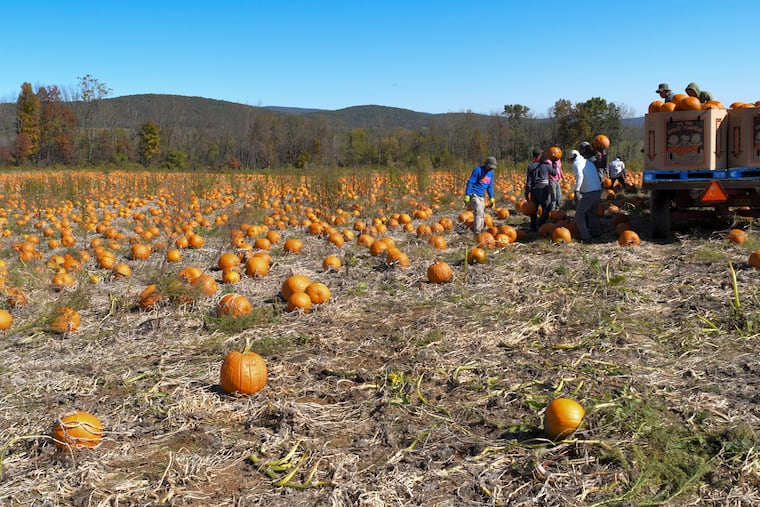America’s Halloween obsession, and migrant labor, helped one man become Pennsylvania’s pumpkin king
Farmer Brian Campbell said migrant workers are vital to harvesting his 2,000 acres of pumpkins every year.

BERWICK, Pa. — Imperfect pumpkins with broken stems were left behind to rot. Some sat squashed by tractor tires or half-eaten by deer. Thousands of others remained, though, clean, round, and ready for carving. They stretched out like a wildfire across this rolling field in Columbia County.
On a cloudless October afternoon, pumpkins were hurtling through the air, too, one after another, tossed and caught by the migrant workers who help make Halloween happen in Pennsylvania and states beyond.
This is Brian Campbell’s pumpkin empire, and it all began with a roadside produce stand he opened when he was 14. In the decades that followed, Halloween evolved into a multibillion-dollar industry, one that allows thousands of American farms to bring in extra income with corn mazes and haunted attractions. The holiday has propelled Campbell, now 53, from hundreds of pumpkins sold per season to the 600,000 he grows on 2,000 total acres across the county.
“Come Labor Day, our pumpkins are in the store,” Campbell said. As of early October, “we are shipping out jack-o-lantern pumpkins all day.”
To dial more into the nation’s love of all things Halloween, the advertising company Quantcast broke down the most “pumpkin-obsessed” states in the country based on web searches and found many of them are in the Northeast, including New Jersey. Pennsylvania residents were deemed “pumpkin lovers,” but not “obsessed.”
Pennsylvania is ranked seventh nationally in pumpkin production, with 74 million pounds coming out of 1,300 farms, according to the Pennsylvania Farm Bureau. Illinois is often the country’s top producer, along with Indiana and California.
“Like most crops in Pennsylvania, it’s about the soil,” Campbell said.
Pumpkin harvesting is still very much a backbreaking job. No mechanized harvester is capable of picking up 10- to 20-pound pumpkins, gently, and stacking them into bins without smashing them. That’s work for human hands, and Campbell was adamant when he said his crop couldn’t be harvested without migrant workers who come to the United States on temporary agricultural visas, also known as the H-2A. All of his 48 workers are from Mexico, he said, and by law, he has to provide and pay for their housing. Most make $13.50 per hour.
"The local workers wouldn’t do this work,” he said. “I couldn’t operate without [migrant labor], and I wouldn’t even try to.”
In the field last Friday, about 125 miles northwest of Philadelphia, nearly 20 of Campbell’s workers were walking slowly beside a tractor that towed trailers of cardboard bins, each with Charles Schulz’s iconic “Great Pumpkin” artwork on the side. Laborers on the ground grabbed each pumpkin, heaving it into the air to a man atop the trailer who caught it and placed it in a bin. The workers all had beads of sweat across their brows, and Campbell said they’d be at it until nightfall.
Campbell’s most valued employee, Roller Santiago, is his only undocumented worker, and he made it a point to talk about the man’s plight. He is facing deportation. Santiago, 26, has been in the U.S. since he was 14, Campbell said, and has no criminal record. In 2012, a police officer in Benton pulled Santiago over and confiscated his cash, approximately $700, his pay for the week from Campbell’s farm. The officer didn’t identify himself and didn’t give Santiago a receipt. He just left the scene. Santiago was not charged with a crime.
“I heard about it the next day, and those things really bother me,” Campbell said. “We took that information and got the State Police involved, and it took two years but we ended up in court, and that guy did jail time, lost his job, and had to pay restitution.”
Campbell said Santiago, who was born in Michoacán, is now eligible for a U-visa, available for victims of crime. Campbell, a Republican, has lent him money to fight his case and believes the nation’s farms would be hard-pressed to harvest crops without undocumented workers.
“I’m an ethical, do-the-right-thing type of guy,” he said. “The general public has no idea. There are undocumented that are involved in drugs and they don’t belong here and they’re causing a lot of problems, but they’re also causing problems for the ones that are here and doing the right thing. If all these people have to go home, we’re in trouble. Big trouble.”
Santiago, sweat and sunblock dripping down his face, knows nearly as much about pumpkins as Campbell does.
“In Mexico, I’d probably be making $100 a week," Santiago said. “This is the reason why I wanted to come here.”
One oddity about this ever-growing crop is that few of these pumpkins are eaten, nearly all of them grown for decoration and jack-o-lanterns.
Pumpkins used for baking are a different, sweeter variety, Campbell said. According to the Farm Bureau, most of those grown for Libby’s pumpkin pie mix and other edible pumpkin products are from the Midwest.
Campbell said he doubts anyone eats his pumpkins besides deer, their No. 1 enemy before the carving knives come out. Along with deer, excessive rain can also decimate crops and lead to fungus and rot. Last year, floods destroyed over $1.5 million worth of Campbell’s sweet corn and pumpkin crops, but the former Penn State wrestler said he’s not one for quitting. This year, early summer rains presented a challenge, he said, and he planted pumpkins later than he ever had before.
“Last year, we got hammered with the floods," he said, "and most people would have just said they had enough and quit.”
But for Campbell, “In wrestling” — as in pumpkins — "you never give up.”